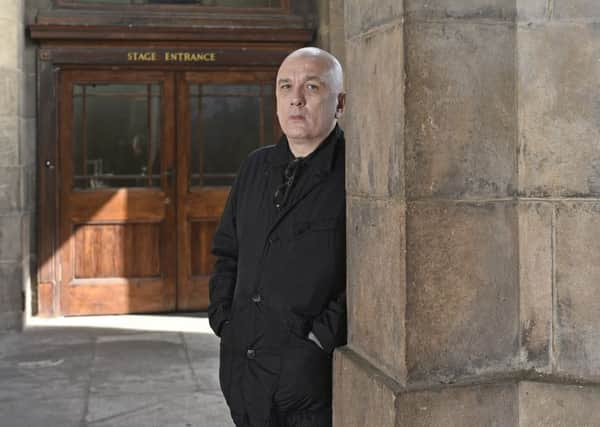Anti-war play to bring vital piece of theatre and act of remembrance to Leith


Some are straightforwardly sentimental and patriotic; others ask tough and controversial questions about the human cost of four horrific years of trench warfare.
It is rare, though, to see a play performed in Britain reflecting the perspective of the nations and cultures that went down to defeat in 1918; and unusual to see any piece of theatre that achieves the heights of scorn and fury shown by the great Austrian satirist Karl Kraus, whose fierce 1918 epic The Last Days Of Mankind – about the horror and destructiveness of the conflict, and the war-mongering stupidity of the thinking that led to it – reflects the despair of a great multinational state in meltdown, as the Austro-Hungarian Empire collapsed.
Advertisement
Hide AdKraus’s massive play – which he described as “unperformable” – is part documentary and part drama, at first expressionist in style, latterly more like a disjointed atonal cabaret; and back in 1983, the Citizens’ Theatre created an unforgettable Edinburgh International Festival production of it at the Assembly Hall, featuring artistic director Giles Havergal as Kraus, the narrator.
Yet neither that glittering precedent, nor the daunting scale and complexity of the play itself, has blunted the enthusiasm of the Glasgow-born and Leith-based director John Paul McGroarty, who has spent the last four years planning, dreaming, and – with his producer Alexandra Lort-Phillips and executive producer Mike Griffiths – putting together an ambitious international version of Kraus’s play, to be performed at Leith Theatre on and around Armistice Day.
“I know there’s huge enthusiasm for Leith Theatre as a music venue,” says McGroarty, referring to its recent partial reopening for the Hidden Door festival and Edinburgh International Festival, after decades of darkness. “But I remember seeing Edinburgh Festival productions there more than 20 years ago, and I have a passionate belief that the space can work for theatre as well as for music.
“Four years ago, I said I would create something for Leith Theatre, to mark the 100th anniversary of the end of the war; and as soon as I began to work on The Last Days of Mankind, everything started to fall into place – not easily, because it’s been a huge production job, but the project just seemed right.”
It’s small wonder that the project has been almost four years in the making, given the complexity of what the production team are undertaking. McGroarty’s principal creative collaborators are Theater Labor, based in Bielefeld, north Germany, and Yuri Birte Anderson of Theatre Labor will co-direct the show with him. The show also involves collaborating companies from Poland, Serbia, France, the Republic of Ireland and Ukraine, each of which will work on and perform a number of short scenes from the total of 200 in Kraus’s script – McGroarty hopes the show will feature about 40 scenes altogether.
The production is based on a recent full translation by Netherlands-based Irish writer and academic Patrick Healy. And in a real theatrical coup, McGroarty has succeeded in involving the Tiger Lillies, the remarkable trio of musicians and theatre-makers led by the charismatic Martin Jacques, whose work is said to combine “the macabre magic of pre-war Berlin with the savage edge of punk”.
Advertisement
Hide Ad“As soon as I contacted Martin Jacques, he just seemed to fall in love with the project and with Kraus’s play,” says McGroarty. “He began to write songs immediately, and he’s now written almost 30; we’re going to have to choose about a dozen, which the Tiger Lillies will perform live with us, in Leith.”
Jacques has described Kraus’s work as “very sarcastic, black humour of the kind of I love, perfect for the Tiger Lillies”; and overall, the intensely collaborative and international nature of the project has not only enabled it to access European funding, with Creative Scotland and Creative Europe contributing the bulk of the budget, but also lends itself perfectly to the idea of Kraus’s play as an intense, free-flowing political cabaret, staged in what will be called “Cafe Europa”, in the main space of Leith Theatre.
Advertisement
Hide Ad“It’s a bit of a happening, really,” says McGroarty, “and there is some jeopardy in it for us as directors, since we’re having to trust the companies, and let it happen – although we’re pretty determined to keep it to less than three hours, including breaks for coffee and cake.
“What I’m sure of, though, is that the Tiger Lillies and all the theatre companies involved are all, in different ways, entwined with the history of Europe over the last hundred years – whether it’s the fact that Theater Labor come from Bielefeld, once a huge British Army base in the post-war years, or Kultur Medialna from Dnipro in Ukraine where a civil war is being fought right now.
“When you think about the First World War, you realise that it shook and reshaped the whole continent, from Dublin to Moscow and the Middle East, in ways that still affect our lives a century on.
“It is fascinating to read Kraus’s savage account of a world going down to a disaster that could probably have been prevented; and it would be foolish to think that that couldn’t happen again today. So although we’ve been true to the period of the Kraus play, and have made no direct attempts at updating, we hope this will be a very special, very radical commemoration of the end of that war; and a fiercely international one, for our time.”
The Last Days of Mankind is at Leith Theatre, from 10-11 and 13-16 November.